Could this be Belfast’s most peaceful summer?
Members of Northern Ireland’s Catholic and Protestant communities reflect on the cancellation of ‘marching season’.
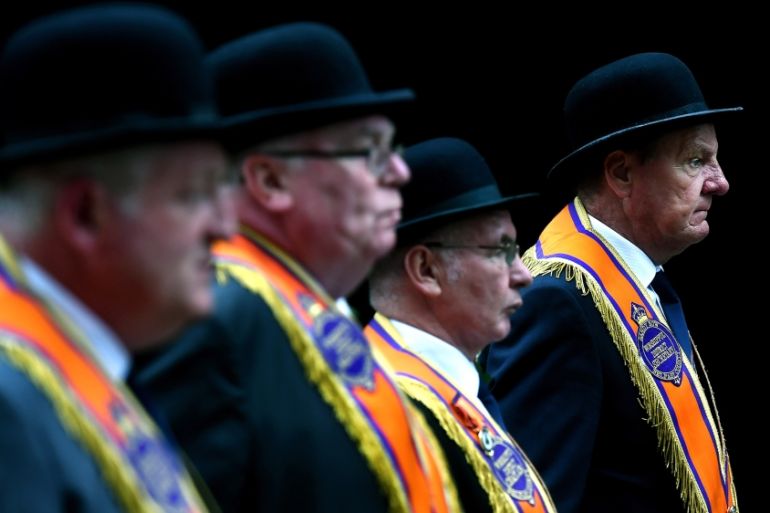
Belfast, Northern Ireland – Take a walk down Belfast’s unionist Shankill Road and turn left. Just a short stroll around the corner you will find a new addition to the weather-worn railings outside the popular Woodvale Park. There, flapping in the city’s summer breeze, hangs a recently erected banner. In bright, white letters against a blue tarpaulin background, block capitals proudly declare that: “ULSTER SAYS NO … to the Corona Virus.”
At least half the defiant slogan should be familiar to those acquainted with Northern Ireland’s tumultuous past.
Keep reading
list of 4 itemsThe Kung Fu Nuns of Kathmandu
Muslim pupil loses UK court bid over Michaela school prayer rituals ban
Photos: Sikhs celebrate harvest festival of Baisakhi, marking new year
Indeed, the Protestant unionist portion of this community has a long track record of saying “no”. It has memorably said “no” to breaking free from Britain, wanting instead to stay part of the United Kingdom. It historically said “no” to “Home Rule”, the demand that the governance of Ireland be returned from Westminster in London to a domestic parliament on the island of Ireland. And lately, it has said “no” to a new act offering equal status to the Irish language.
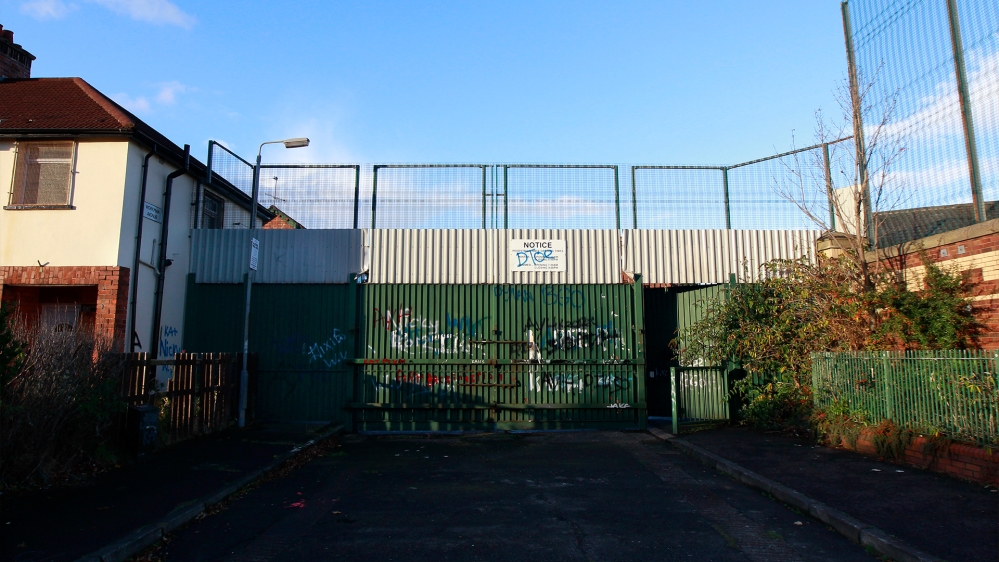
Of course, there has always been another, equally vocal, segment of this community – the largely Catholic nationalists – who have traditionally said “yes” to all of the above.
Perhaps that is why it is so unexpected to see the old habit of “naysaying” as a symbol of hope in this time of unprecedented crisis.
A fragile peace
To the outside observer, the new sign appears to put into words a burgeoning unity in the city. It has been slowly building over the past few months as neighbours, on both sides of the divide, have joined in the Thursday night clap – standing at windows and doorways in a gesture of appreciation for the front-line workers in the battle against COVID-19. With religious and political affiliation laid aside, the city becomes one force against a common foe, for now.
But any peace in Belfast is fragile.
This place still bears the scars of its violent and not-so-distant past.
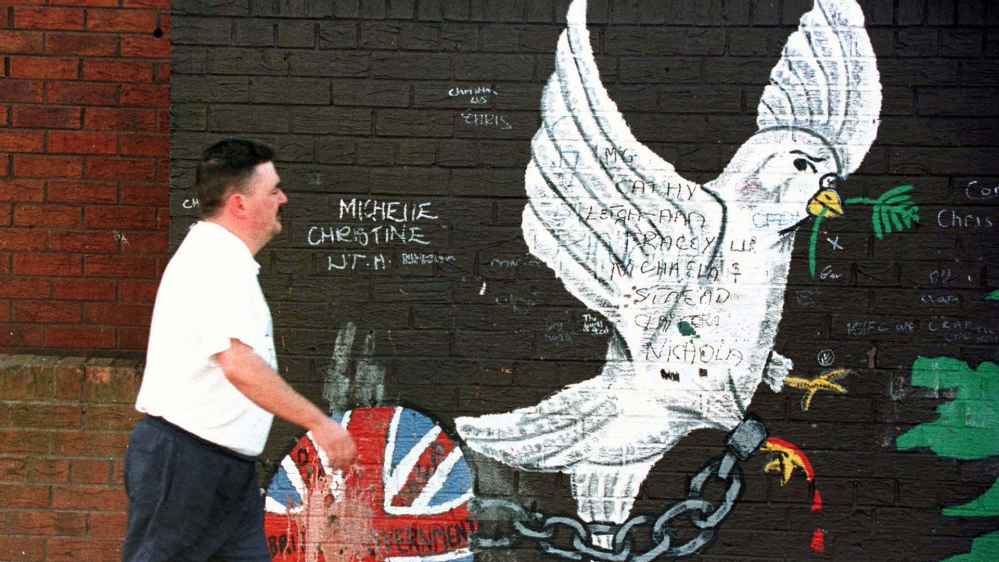
More than 3,600 people died during “the Troubles”, and tensions continue to bubble beneath the surface of everyday life.
Nearly a quarter of a century after paramilitary groups officially declared ceasefires, they continue to exert dominance via extortion and bloodshed. They are also still recruiting, according to the Police Service of Northern Ireland, who consider young people especially vulnerable, as gangs use drug debts to blackmail them into membership. Between June 2018 and June 2019 there was one paramilitary-style punishment attack every four days in the North.
Seen as an alternative ‘quick fix’ to the traditional justice system, victims as young as 16, are sentenced to beatings, shootings and kneecappings. The current deterrant designed to spread fear among supposed ‘wrongdoers’ is called a ‘six pack’ and involves shooting the victim in the knees, ankles and elbows, when their alleged offence is considered particularly heinous. Chief Constable of the PSNI, George Hamilton, warned two years ago that parents had begun numbing their children with alcohol and painkillers in advance of ‘appointments’ with these ‘punishment gangs’.
The very architecture of Belfast, an otherwise modern European capital city, betrays the shaky foundations of supposed normality built upon the 1998 Good Friday peace agreement.
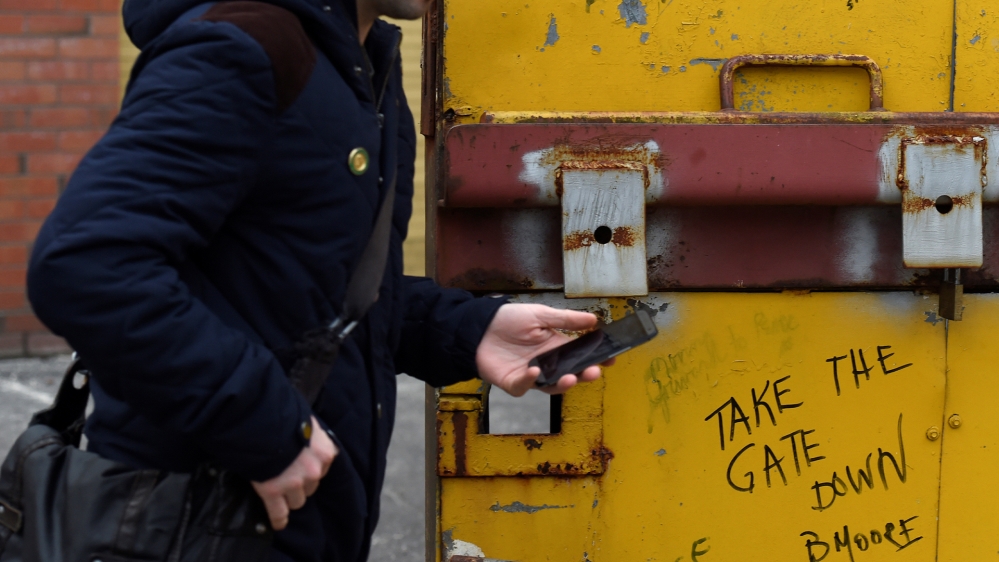
Today, towering above homes and businesses, are barbed-wire “peace walls”. A popular tourist attraction, it is easy for visitors to forget the imposing structures they photograph are designed to physically separate Catholics and Protestants, nationalists and unionists. So-called “peace gates” allow movement between sides during daylight hours, but they are solemnly shut at night, or earlier if trouble looms. Which it does, most frequently during the summer months.
For the first time since World War II
This summer could be different though. That is because one of the biggest flashpoints for violence has been cancelled due to the coronavirus pandemic. In April, it was announced that the annual Orange Order Parades would not go ahead for the first time since the second world war.
Social distancing rules and a ban on gatherings led the Order to prioritise the safety “of the entire community”. It decided to call off the commemorative marches which traditionally attract around half a million people onto the streets.
For the uninitiated, the parades, which form marching season, celebrate the 1690 Battle of the Boyne when, on July 12, Protestant King William of Orange defeated Catholic King James.
This year parades were due to take place at 17 venues across Northern Ireland with the attendant pomp and circumstance of pipe bands and bonfires, of bowler hats and Orange sashes and many, many miniature flags.
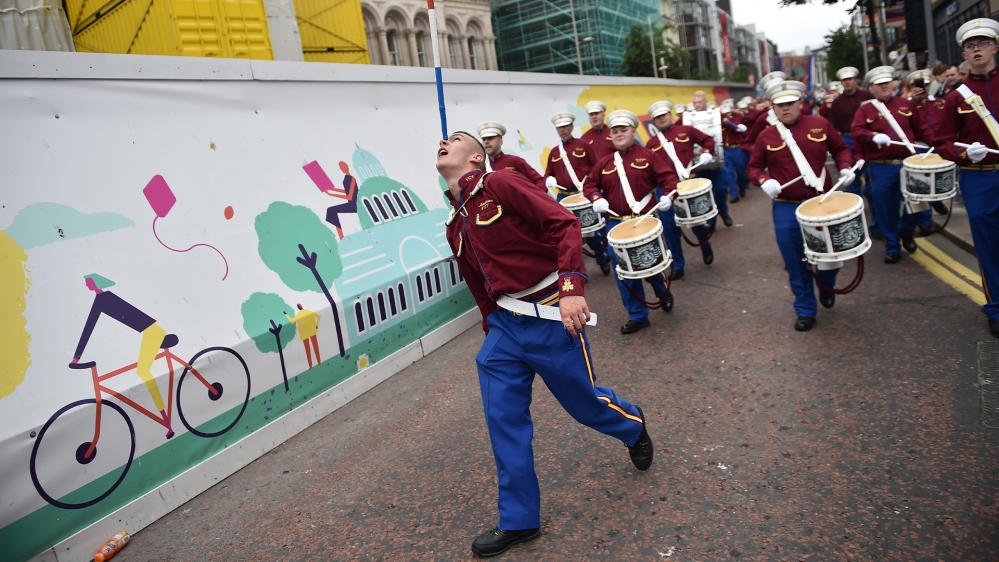
Unionists believe the marches are a fundamental part of their cultural heritage. The problem is that sometimes the path of their heritage takes them, in real time, past their less than enthusiastic Catholic neighbours.
The new coronavirus cancellations however mean this issue is suddenly rendered obsolete and it becomes tempting to wonder whether an altogether quieter few months are in store for Belfast.
‘Triumphalism of the apartheid state’
Fifty-seven-year-old Maire McDonnell is optimistic. “I’m actually looking forward to the summer for once,” she explains. “Any other year I would be dreading it.”
Maire, born and bred in the nationalist Short Strand area of East Belfast, is a Catholic and a Republican. Her home, with its proximity to the city centre, close to the banks of the famous Lagan River, in another place would be considered “posh”, she jokes. As it was, she grew up as part of a small enclave of nationalist houses, surrounded by a largely unionist community.
“Coming up to the 12th things always seemed to get worse. You could be living in a lovely street and coming up to the 12th people would start putting up Union Jacks outside their house and then start not speaking to you. The change would come. It was awful.
“The intimidation was fierce, at the very least name-calling and bullying. But more in my experience, it was actual attacks. I’ve seen my peers being attacked with acid. Some of my peers have been beaten and left for dead. People have been trailed out of their cars [at marches] and beaten. You’d be afraid of your life to go into town.
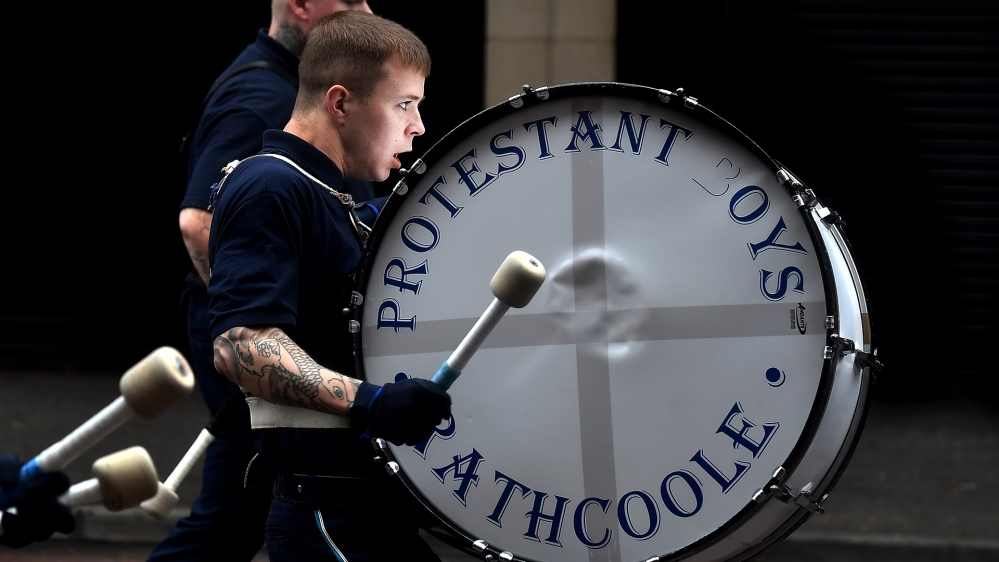
“I have lost so many of my peers to sectarian attacks I can barely talk about it. I remember there was a bomb exploded and it injured several of my brother’s friends, young teenagers in a bar. There was three killed. One of them lost both his legs, another one lost one of his legs and it was coming up around the week of the 12th when it happened and they still put all the flags up just across from where that bomb had exploded and they [the marchers] stood there and sang a song called ‘Bits and Pieces’. I’ll never forget that, never,” she says, her voice drifting away into silence and memories.
These days temporary fencing is erected while parades pass by the Short Strand, but Maire describes the feeling of being trapped in her own home. “We’re sealed off and hemmed in. If you need to go to the chemist, or to the Post Office you’d be terrified and you’d not even bother doing it because you’d be too scared. I think that the 12th of July is symbolic of the domination and triumphalism of the apartheid state that we live in.”
So what does Maire think about the cancellation of this summer’s marching season?
“It’s really great,” is the answer. “Maybe this summer I’ll be able to go into town for the first time in my lifetime. I’ll just be able to go wherever I want. If I take it into my head I want to go into town, or if I take it into my head I want to go for a wee drive into the country, or the beach, or anywhere on a lovely sunny day, I can go, without fear.
“I think if the virus should have done anything, maybe it should help people think on a higher level, not a small-minded way. Who wants to see someone walking down the road in a bowler hat? C’mon, it’s pure silly and I don’t even think it’s relevant anymore. Next year why don’t you have a music festival? I know it’s religious for people, but you could have a nice gathering in a lovely park somewhere and have your prayers and your music for younger people and then just go home.”
‘Parading is part of my culture’
The suggestion that marches be abandoned in favour of a music festival sounds like old-fashioned “intolerance” to Mervyn Gibson.
The 61-year-old grand secretary of the Grand Orange Lodge of Ireland spends his days as a Presbyterian minister and happens to live only 100 yards away from Maire in East Belfast.
He followed his parents and grandparents into the Orange Order and began marching at the age of five.
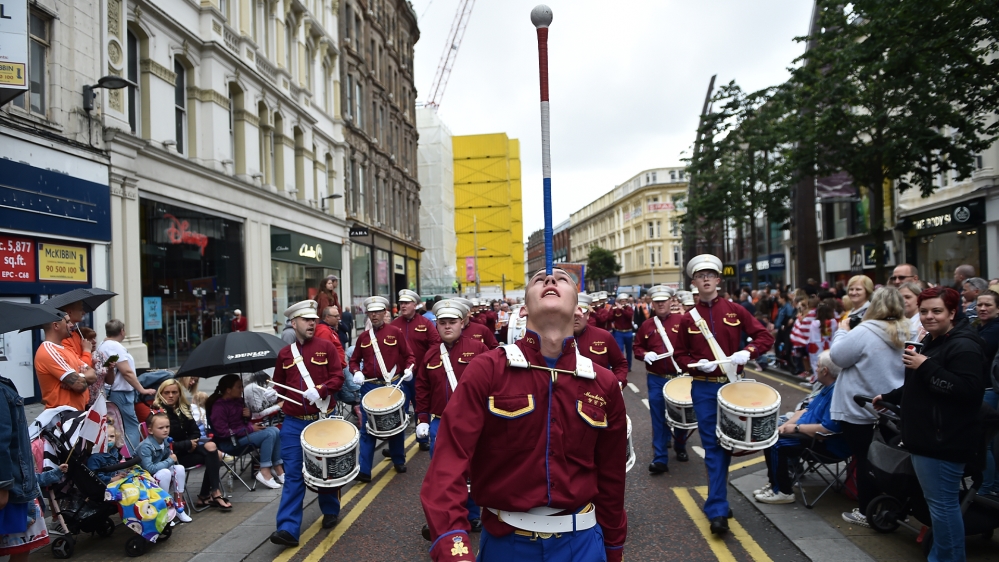
“Part of my culture is parading,” he says. “I don’t say to a nationalist give up the GAA [Gaelic Athletic Association]. I don’t say forget your Irish dancing. I’m not trying to mould and shape Irish culture, but she’s trying to mould and shape British culture.
“First it would be stop parading and go and play music in the park and next it would be what music you’re allowed to play. I think it’s morally wrong to try and impose your views on a culture. I think many within the nationalist community think we parade to annoy them. The last thing I think of when I’m going on parade is to annoy anyone. I want to have a good day with my friends and my family.”
Marching, despite its military history, is these days a community activity according to Mervyn.
“I can tell you even now where my aunties, who are long dead, stood watching the parade every year, where I see my cousins watching the parade. People always stand in the same place as a family.
“I was a message boy when I was 14 for a shop and the lady who served in that shop still gives me a can of Coke when I walk up the Lisburn Road. I wouldn’t want to walk where I wasn’t wanted, but you either have a totally shared society or you don’t.”
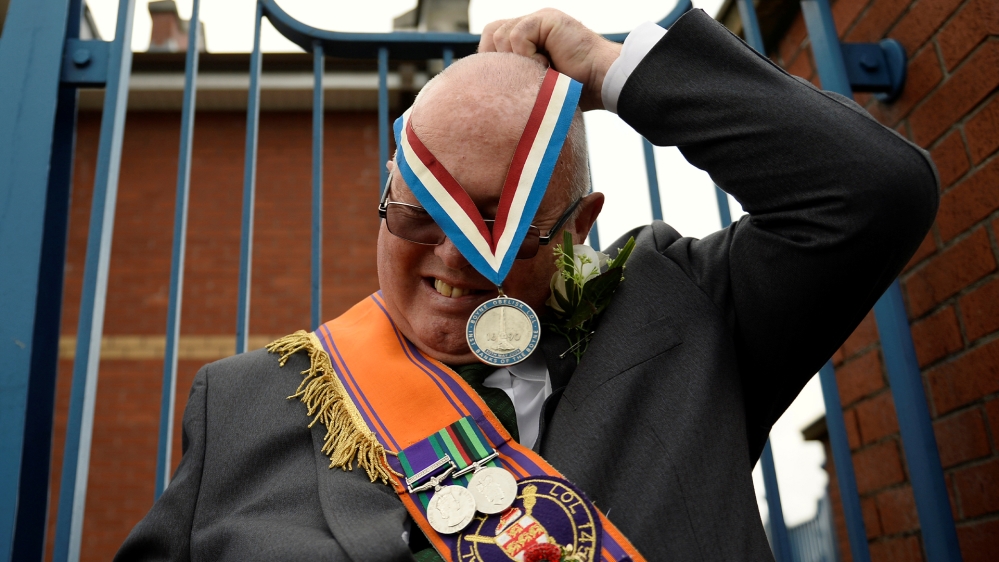
Despite his fondness for marching, Mervyn explains that it was the “civic-minded spirit” of the Orange Order that prompted it to put parades on hold for now.
“We realised that [the marches] couldn’t be allowed to happen because of the potential to spread coronavirus. Also, it meant that the resources in place could be directed to addressing the actual virus itself and deal with it, as opposed to looking toward us with all the traffic and other things that have to be in place, so it was for the greater good of our community and all communities. During COVID we’ve been congratulated, even by some people who would be regarded as our enemies, for our local Orange Order response. We took the lead in delivering groceries to people in their homes. We took the lead in picking up prescriptions.”
An example for future summers?
But what if this summer, devoid of marching season, turns out to be an unprecedented oasis of calm in an otherwise turbulent landscape? Does that put the future of parades in peril?
“No,” says Mervyn decisively. “We’ll be back next year parading hopefully bigger and better. Next year is 2021 and that’s the centennial of Northern Ireland. We will be going out to celebrate that.
“There’s always been issues with parades and to be honest there’s things no doubt we have done in the past that we shouldn’t have done. But that was life in those days. I think we’ve changed over the years, everybody’s changed.”
Change, it seems, is the buzzword of 2020. The Northern Ireland Executive hopes to have society reopened by the end of August. By the end of June, 547 people had died from the virus here, but the level of community transmission, the R rate, has dropped below one.
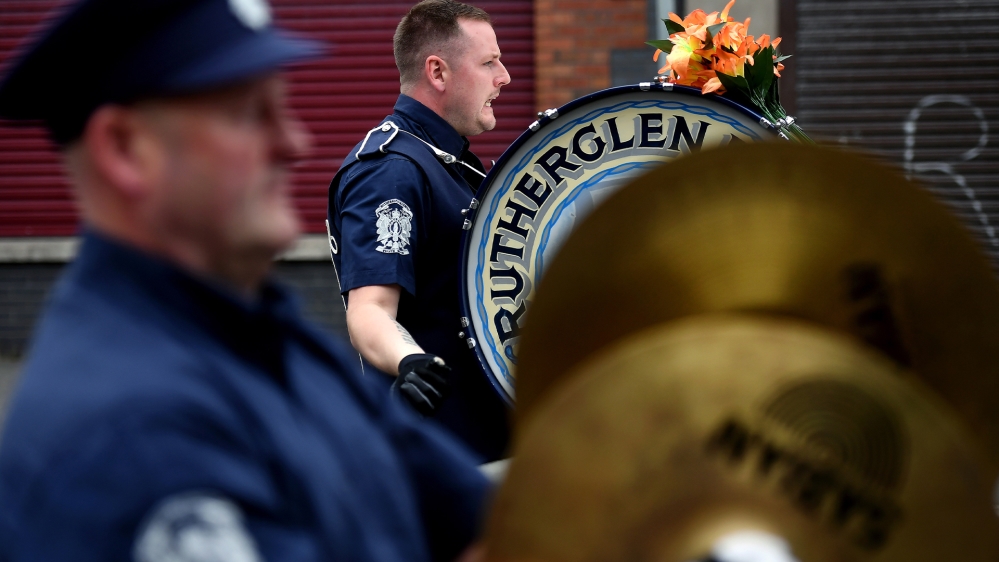
Despite the progress, current guidelines mean mass gatherings, including parades, remain on an historic hiatus. What effect that will have on the city of Belfast has yet to be seen. What is certain, is all major political parties agree marchers should stay home.
The non-sectarian Alliance Party says, “We are not out of this pandemic. The evidence is lockdown and the lack of large gatherings is suppressing the spread of the disease.”
The Democratic Unionist Party believes, “The priority for us all must be public health and protecting lives.”
While Sinn Fein says, “Now is not the time for impatience to get the better of us. Having come so far it would be a crying shame to undo it.”
If they will still be in harmony this time, next year is anyone’s guess.